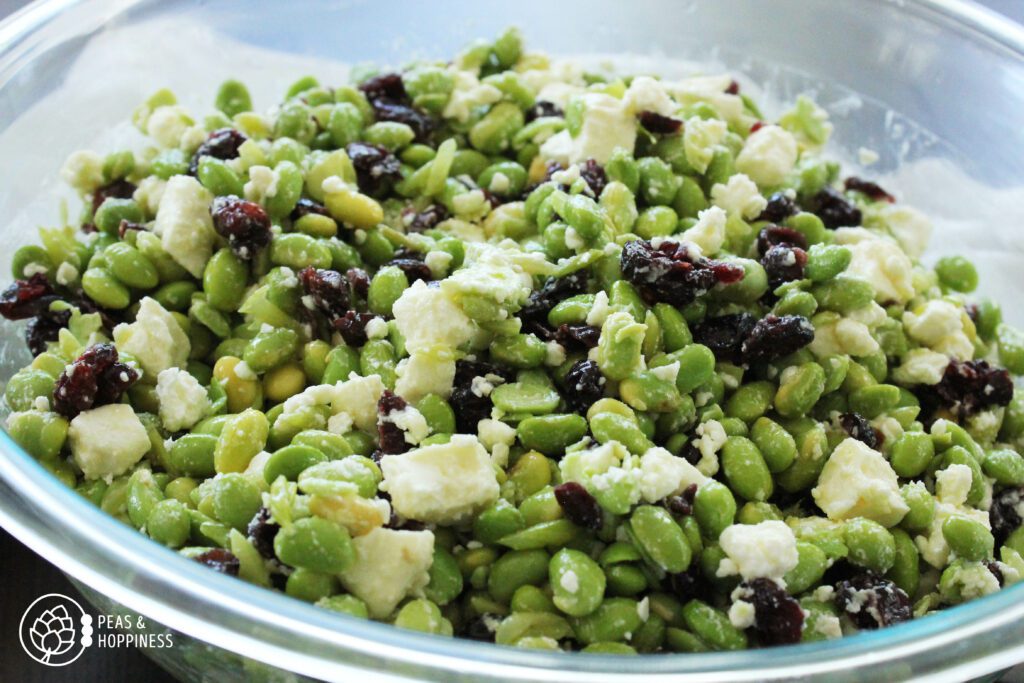Soy foods like tofu are an excellent source of plant-based protein. Do soy health benefits outweigh the risks for breast cancer, heart health, and more?
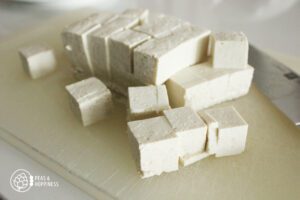 If you’ve considered moving towards a plant-based diet, soy is at the top of the list of protein-rich plant foods.
If you’ve considered moving towards a plant-based diet, soy is at the top of the list of protein-rich plant foods.
Soy claims this top spot for good reason: it’s packed with protein, healthy fat, and phytonutrients called isoflavones. But in the last few decades certain health concerns have been raised.
What’s the truth about the health of soy? Read on to learn if you should include tofu and other soy products in your eating pattern.
Is Soy Healthy for You? What are the Health Concerns about Soy?
Studies across populations have shown different health outcomes for people with a high versus low soy intake. Countries like Japan where people consume high amounts of soy have lower rates of breast cancer compared to many Western countries who have very low soy consumption.
Soy isoflavones and the hormone estrogen have a similar molecular structure. Because of this similarity, researchers hypothesize that soy might have either protective or harmful effects on conditions related to estrogen, such as breast cancer or male feminization.
Because of conflicting hypotheses, the question has been asked: is soy – and are soy isoflavones – healthy or harmful?
What are Soy Isoflavones or Soy Phytoestrogens?
Many of the health concerns around soy have been related to soy isoflavones, also called phytoestrogens. These are compounds which have a similar molecular structure to the hormone estrogen.
Soy is the only food which contains a meaningful amount of isoflavones; if a person’s diet doesn’t include soy, it’s virtually devoid of isoflavones. Very small amounts are also found in beans, some fruits and vegetables, and non-edible plants such as clover (1).
The isoflavone content of soy depends on the amount of processing it’s gone through (1):
- Whole Soy Foods: Soybean, tofu, edamame, TVP (textured vegetable protein or soy flour) contain 3-4 mg/gram of protein; 1 serving of whole soy foods= about 25 mg isoflavones
- Soy Protein Supplements: Soy protein isolate (90% protein) and soy protein concentrate (65% protein) contain about 0.02-0.1mg per gram of protein; one serving of 8g protein = 2-8mg isoflavones
- Processed Soy Foods: Impossible burger contains only about 2 mg isoflavones
When considering the health of soy in the diet, whole soy foods will have a different impact on health benefits and risks because of the much higher content of isoflavones.
The Truth about the Safety of Soy Foods (Health Benefits of Soy Protein and Isoflavones)
All major medical organizations agree soy foods in general are safe to eat, including the Food and Drug Administration, the American Heart Association (2), the American Cancer Society (3), and the National Institutes of Health (4). In fact, the American Heart Association recommends choosing plant-based proteins such as soy over animal proteins for heart health (2).
Although the molecular structure of isoflavones and the hormone estrogen appear similar, soy isoflavones act differently in the body than the hormone; isoflavones are not “weak estrogen” as it has sometimes been called. The mechanism of action is still not well known, but it appears that one difference is isoflavones bind more to certain estrogen receptors but less so with others (1).
The concerns about soy almost all originate from animal studies, specifically rodents. But because rodents metabolize soy much differently than humans, these studies can’t be relied on to understand the full picture. Research in humans, including clinical trials, observational studies, and population-level research almost all show a beneficial effect of soy on multiple areas of health.
Read more: Why Nutrition Research Seems So Confusing
Soy Protein and Heart Health: Is Soy Good for your Heart?
Soy protein appears to have a protective effect against heart disease. The FDA is currently reviewing the claim about if soy protein has a cholesterol-lowering effect. It hasn’t released its decision yet (as of 5/5/2023). The claim was originally approved in 1999 and it has not been redacted; although the data are somewhat inconsistent, there could be as much of a 3-4% reduction in cholesterol with increased soy intake.
One of the major challenges of understanding if this claim is true is most Americans do not consume enough soy with enough regularity to see the effect. In the studies reviewed, the amount of soy needed would be equal to just over 1 cup of tofu per day, or about 3 cups of soy milk. Additionally, ultra-processed foods which contain high amounts of soy protein may not have the same results because the overall health profile of the food may not be beneficial (5).
Despite this confusion, increasing soy protein from foods like tofu in the diet often replaces other less healthy foods, such as animal products which have saturated fat. This switch to a healthier blend of fats in the diet is likely to significantly reduce the risk of heart disease (6).
A recent population (epidemiological) study of American men and women found that those who ate the highest amounts of tofu had an 18% reduction in risk of heart disease compared to the group who ate the lowest amount (7).
Soy Isoflavones, Phytoestrogens and Breast Cancer Risk: Should you Eat Soy if you Have Breast Cancer?
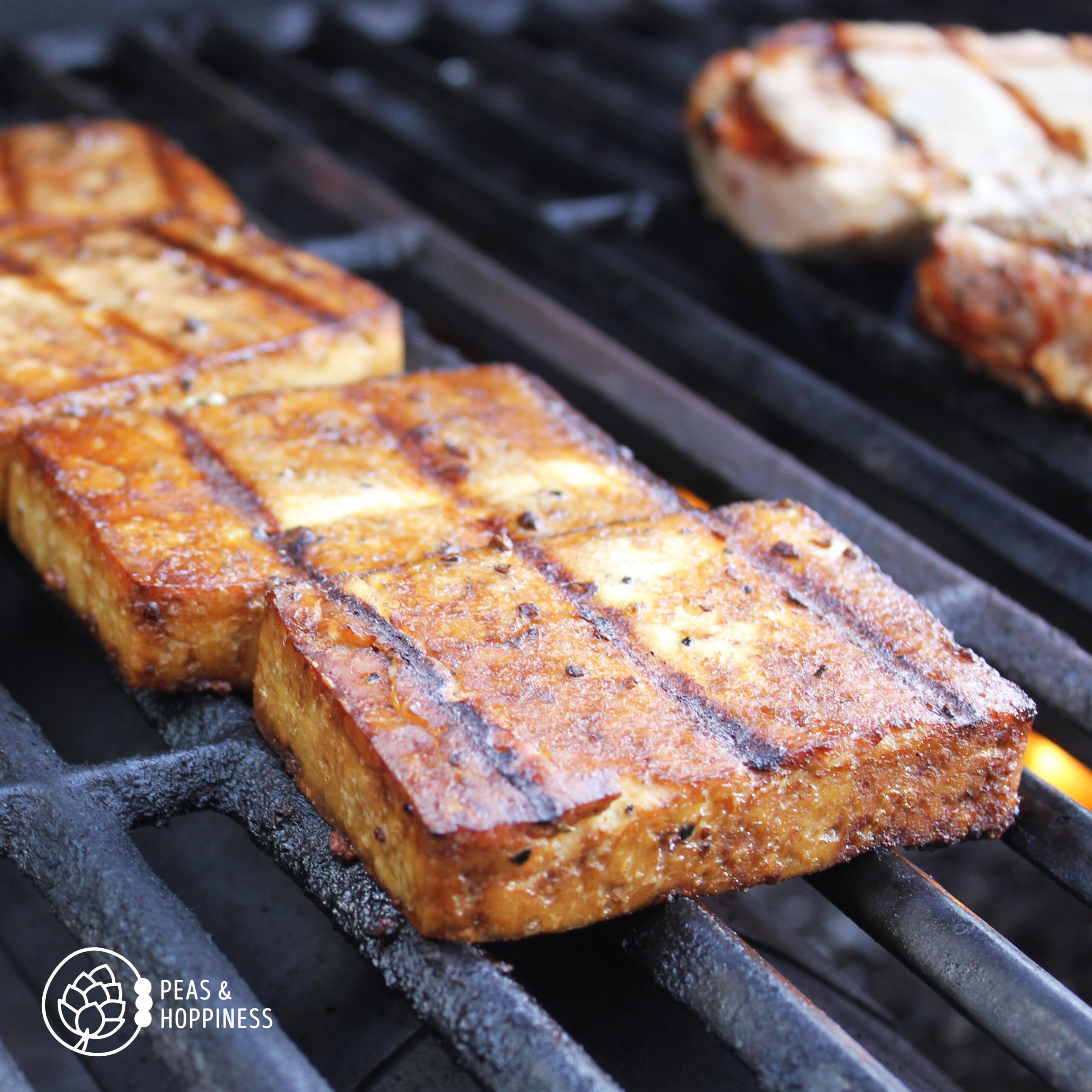 The link between soy and breast cancer is somewhat complicated: there are many different types of breast cancer; there may be a difference in the effects based on menopausal status; and the timing of soy intake during one’s lifetime makes a difference in the protective nature of soy.
The link between soy and breast cancer is somewhat complicated: there are many different types of breast cancer; there may be a difference in the effects based on menopausal status; and the timing of soy intake during one’s lifetime makes a difference in the protective nature of soy.
Because soy isoflavones are similar in structure to estrogen, there has been concern about the effect of soy on some types of breast cancer. Studies done in animals and cells have shown that high doses of isoflavone may cause cancer cells to proliferate. However, rodents metabolize isoflavones much differently than people; this effect does not seem to be true in human studies (3). Observational studies and clinical trials in humans appear to show the opposite, that soy intake is protective against breast cancer (1).
A few highlights of the effect of soy on breast cancer:
Consuming soy lowers the risk of developing breast cancer:
- The Shanghai Women’s Health Study found that premenopausal women who ate the most soy had a 56% lower risk of breast cancer compared to the group who ate the least. (7)
- Soy consumed during childhood and teenage years appears to be most effective at lowering risk of cancer, by as much as 25-50% from 1 serving of soy per day, based on the Shanghai Women’s Health Study. It’s thought that the isoflavones can impact the developing breast tissue. More research is needed. (1, 7)
Consuming soy lowers the risk of breast cancer recurrence:
- In Estrogen-Receptor Positive (ER+) cancer, soy intake may be beneficial because it may act as an anti-estrogen. (1)
- In American women who were breast cancer survivors after 6 years, recurrence of cancer was lower in ER+ tumors but in ER- no significant association was observed. (7)
- Although hormone replacement therapy is contraindicated in women who have previously had breast cancer, soy does not cause breast cell proliferation or affect tissue density. (1)
In women who have breast cancer, consuming soy lowers the risk of death:
- There may be as much as a 12% reduction in breast cancer deaths with each 5 grams of soy protein per day consumed (7)
More study is needed, but almost all research shows that consuming soy has either a neutral (no) effect or a protective effect on breast cancer risk, recurrence, and risk of related death.
Soy Intake and Thyroid Function: Is it Safe to Eat Soy with Hypothyroidism?
Concerns about soy and thyroid function originated in the late 1950s and early 1960s when infants who were fed soy formula fortified with iodine. When soy protein was switched, the problem was resolved. In the early 1990s research in animals also showed some concern about soy isoflavones affecting the production of thyroid hormone in the body. (1)
However, human studies have not shown a link between soy and thyroid function. Specifically, a meta-analysis including 18 studies showed no effect on thyroid hormone production, even though it did appear to raise thyroid stimulating hormone slightly (1, 7)
More study is needed about subclinical hypothyroidism; one randomized, double-blinded clinical trial found that isoflavones in the amounts which could be typically found in a vegetarian diet could increase the risk of developing clinical hypothyroidism. Researchers concluded that women who are vegetarian and have subclinical hypothyroidism should monitor thyroid function (7).
The primary concern with soy is in individuals who need to take a thyroid hormone supplement; it’s important to separate the timing of dosing exogenous thyroid and consuming soy protein by 1-3 hours because the protein can inhibit the absorption of the medication. However, this is also true of many other foods and is not unique to soy or tofu. (1)
Soy Protein and Muscle Mass: Is Soy Protein as Good as Whey Protein for Athletes?
 For body builders and athletes looking to gain muscle mass, whey protein from cow’s milk has long been considered the “gold standard” of protein supplements.
For body builders and athletes looking to gain muscle mass, whey protein from cow’s milk has long been considered the “gold standard” of protein supplements.
Although in the immediate few hours after training studies have shown a benefit of whey over soy, this advantage doesn’t appear to remain true over time. In a recent review of the literature including 9 clinical trials, soy protein was found to promote gains in muscle mass and strength in a similar way to animal protein supplementation (8).
Recent studies looking at the digestibility of essential amino acids, the building blocks of protein, showed that soy protein from tofu and soy milk are comparable to protein from beef (8).
Soy protein is a high-quality protein option for building muscle mass in combination with strength training.
Soy Isoflavones, Phytoestrogens and Male Hormones or Male Feminization: Is Soy Good or Bad for Men?
Although concerns have been raised about the effect of soy isoflavones and phytoestrogens on male hormones and fertility, there has been no quality evidence to substantiate this claim.
A meta-analysis of 41 clinical studies found no effect of soy on male testosterone or estrogen levels, even when men consumed much more soy than the average Japanese male. There have also been consistent findings that soy has no effects on sperm or semen, nor on the risk of developing gynecomastia (8).
Additionally, consuming soy may lower the risk of prostate cancer in men. More research is needed as studies have been inconclusive, but the overall effect of men consuming soy appears to be either neutral or beneficial (8, 9).
Soy Allergy: What Should you do if You're Allergic to Soy?
An allergy to soy is number 8 on the “big 9” allergens in the US. It occurs in about 3 out of every 1,000 adults. About 70% of children who have an allergy to soy outgrow it by age 10.
For the individuals who have an allergy to soy, elimination of the soy protein from the diet is the only treatment. Avoidance of soy can be difficult because soy is used as an ingredient in many processed foods. Soy oil doesn’t elicit an allergic response because soy protein isn’t present.
The American Academy of Allergy Asthma & Immunology recommends early introduction of allergens including soy to babies under 1 year of age to reduce the likelihood of an allergy. Talk with your child’s pediatrician before introducing allergens if your family has a history of allergy (10).
What are the Health Benefits of Eating Soy? Do the Benefits of Soy Outweigh the Risks?
 Soy – and tofu specifically – has a great nutritional profile. Soy foods generally contain linoleic (Omega-6 polyunsaturated) fatty acids, fiber, vitamins, minerals, quality protein, and are low in saturated fat (7).
Soy – and tofu specifically – has a great nutritional profile. Soy foods generally contain linoleic (Omega-6 polyunsaturated) fatty acids, fiber, vitamins, minerals, quality protein, and are low in saturated fat (7).
Tofu’s high-quality protein receives similar quality scores to beef because of the digestibility of the essential amino acids it contains (8). Additionally, it appears that soy protein specifically may reduce LDL cholesterol and thus have a heart-healthy effect, although studies have been somewhat inconsistent and more research is needed (7).
Soy oil is relatively low in saturated fat compared to other oils and contains a moderate amount of monounsaturated fat. About 50% of the fatty acids in soy oil are linoleic, or Omega-6 fatty acids, which is an essential fat. The remaining 6% of fatty acids are linolenic, or Omega-3 fatty acids (11).
While omega-6 fatty acids are an essential acid, the Western diet typically contains proportionally more of this fatty acid than is beneficial. Thus, soy oil is not something to be supplemented in the diet, but is a healthier option than animal fats, coconut, or palm oil.
Tofu also contains a large amount of isoflavones, which have been shown to reduce risks of breast cancer and likely contribute to soy’s heart-health benefits (12).
There are other potential benefits of soy consumption which require more study, including protecting cognitive function and reducing risk of Alzheimer’s and Parkinson’s diseases, as well as alleviating hot flashes in post-menopausal women (7).
The Bottom Line: Are Soy Foods Healthy? Is it Safe to Eat Soy?
Simply put, whole soy foods are a healthy option to add to your eating pattern. Eating soy in place of animal proteins can be particularly beneficial to heart health (2). Consuming soy throughout one’s life, especially during the adolescent and teenage year, appears to be particularly beneficial to reducing breast cancer risk (1, 7).
It’s possible that very high levels of soy intake could be potentially harmful, but it appears that up to 6-8 servings per day is safe (1). It’s not necessary to eat this much soy; consuming more than 4 servings of soy per day could potentially limit the variety of other foods in the diet which is not recommended.
Consuming 1-2 servings of soy products per day is likely enough to confer the health benefits. These are examples of 1 serving of soy; each example provides 7-8 grams of protein:
- 3 ozs Tofu (about 1/3 cup)
- 1/4 Soy Nuts (Roasted Soybeans)
- 1/3 cup Edamame
- 1 cup Soy Milk (unsweetened)
- 3 ozs Tempeh
Much of the soy research focuses on its individual components such as isoflavones or protein, but whole soy foods contain many different nutrients including vitamins, minerals, fiber, and other phytochemicals.
To obtain the benefits of soy, it’s better to eat whole soy foods like those mentioned above rather than consuming a soy protein isolate or isoflavone supplement. More research is needed to see if these individual supplements provide the same benefit as whole soy foods. As with other foods, the nutrients in soy work synergistically: the whole is greater than the sum of its parts.
 If you’d like to start incorporating soy into your eating pattern, try this easy recipe for Teriyaki Tofu & Vegetables Bowls. You’ll love the flavor AND how simply this meal comes together!
If you’d like to start incorporating soy into your eating pattern, try this easy recipe for Teriyaki Tofu & Vegetables Bowls. You’ll love the flavor AND how simply this meal comes together!
For more vegetarian and vegan cooking inspiration including soy protein as well as a wide variety of other plant proteins, start a free trial of the Peas & Hoppy Meal Guide Membership. Every week members receive a new menu with fresh meal inspiration planned around seasonal produce to help you support local farmers.
When you join the membership, you’ll receive weekly instructions for how to modify your menu to be vegetarian, vegan, gluten-free, or dairy-free to meet your personal needs. You also get access to our database of over 800 dietitian-approved recipes, of which over half are completely plant-based!
Once you customize your Meal Guide, your changes automatically update the made-for-you grocery list for you to save you time, money, and stress at the store. Start your risk-free trial today and access this week’s customizable menu online or via our mobile app.
Go forth and enjoy your tofu, soy nuts, and tempeh knowing you’re eating better for your body, your budget, and your planet.
Happy soy eating,
Dietitian Ann
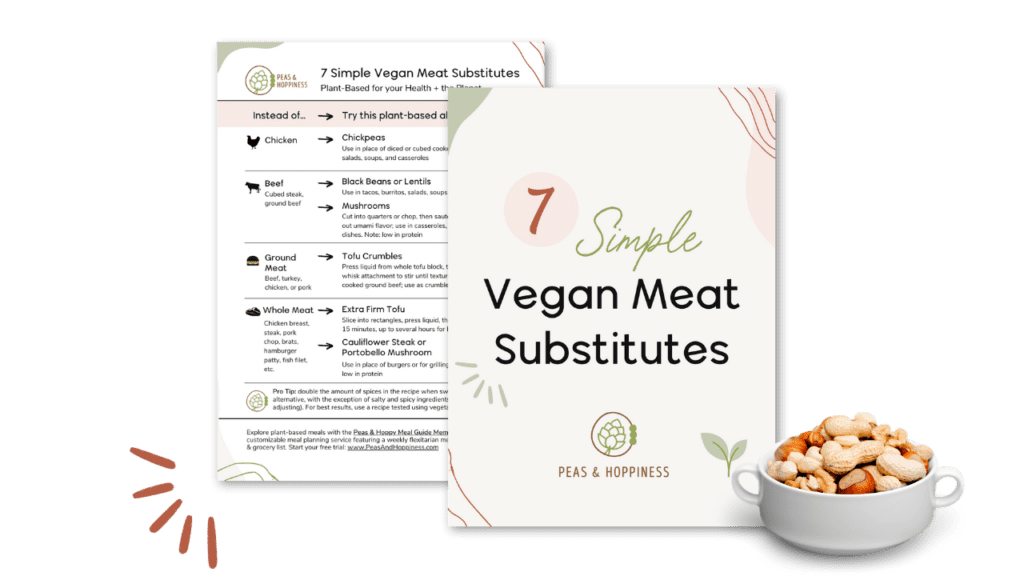
Easy Plant-Based Eating
Download this free guide for 7 Simple Vegan Meat Substitutes to shift towards a plant-based diet. The guide features easy-to-find options available in every grocery store!
- Hill, S., & Messina, M. (2023, May 1). Are Soy Foods Safe? Mark Messina, PhD. The Proof Podcast. other. Retrieved May 31, 2023, from https://theproof.com/are-soy-foods-safe-mark-messina-phd/.
- Lichtenstein, A. H., Appel, L. J., Vadiveloo, M., Hu, F. B., Kris-Etherton, P. M., Rebholz, C. M., Sacks, F. M., Thorndike, A. N., Van Horn, L., & Wylie-Rosett, J. (2021). 2021 dietary guidance to improve Cardiovascular Health: A Scientific Statement from the American Heart Association. Circulation, 144(23), e472–e487. https://doi.org/10.1161/cir.0000000000001031
- Simon, S. (2019, April 29). Soy and cancer risk: Our expert’s advice. All About Cancer. https://www.cancer.org/cancer/latest-news/soy-and-cancer-risk-our-experts-advice.html
- S. Department of Health and Human Services. (2020, December). Soy. National Center for Complementary and Integrative Health. https://www.nccih.nih.gov/health/soy
- Petersen, K. S. (2019). The dilemma with the soy protein health claim. Journal of the American Heart Association, 8(13). https://doi.org/10.1161/jaha.119.013202
- Sacks, F. M., Lichtenstein, A., Van Horn, L., Harris, W., Kris-Etherton, P., & Winston, M. (2006). Soy protein, isoflavones, and cardiovascular health. Circulation, 113(7), 1034–1044. https://doi.org/10.1161/circulationaha.106.171052
- Harvard T. H. Chan School of Public Health. (2022, January). Straight talk about soy. The Nutrition Source. https://www.hsph.harvard.edu/nutritionsource/soy/
- Messina, M., Duncan, A., Messina, V., Lynch, H., Kiel, J., & Erdman, J. W. (2022). The health effects of soy: A reference guide for Health Professionals. Frontiers in Nutrition, 9. https://doi.org/10.3389/fnut.2022.970364
- Soy and Health. Physicians Committee for Responsible Medicine. (n.d.). https://www.pcrm.org/good-nutrition/nutrition-information/soy-and-health
- American Academy of Allergy Asthma & Immunology. (2020, September 28). Prevention of allergies and asthma in children. Tools for the Public. https://www.aaaai.org/tools-for-the-public/conditions-library/allergies/prevention-of-allergies-and-asthma-in-children
- Petersen, K. (n.d.). Fatty acids, health, and soybean oil. Soy Connection. https://www.soyconnection.com/resources/health-nutrition-newsletter/newsletter-article-list/soybean-oil-fatty-acids-and-health
- Merschel, M. (2022, October 10). Clearing up questions on whether tofu is healthy. American Heart Association. https://www.heart.org/en/news/2022/10/10/clearing-up-questions-on-whether-tofu-is-healthy
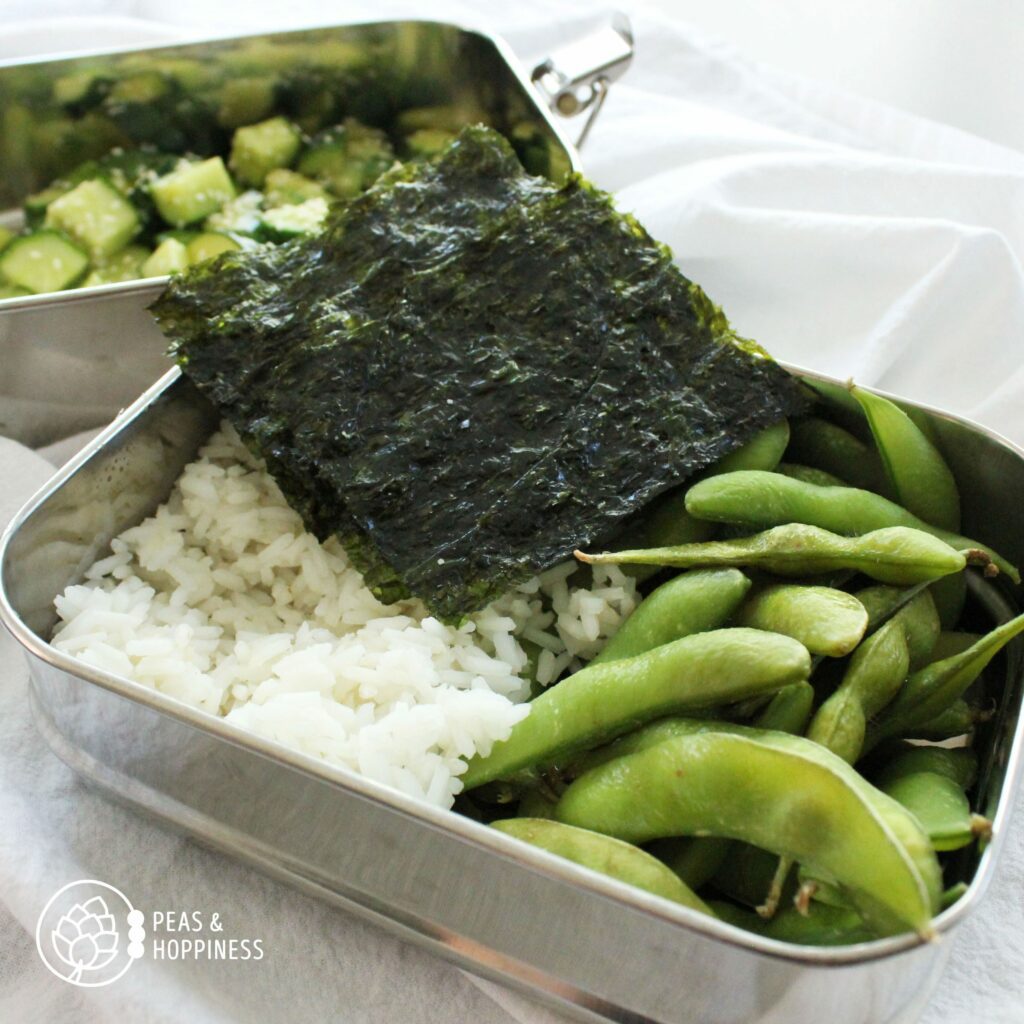
Variety Without the Overwhelm
Start your free trial of the Peas & Hoppy Meal Guides, our customizable meal planning service, and beat the boredom at dinnertime with 10 fresh meal ideas every week.
Each weekly Meal Guide includes four cooked meals, two grab & go meals, two breakfast inspirations, and two snack ideas.
